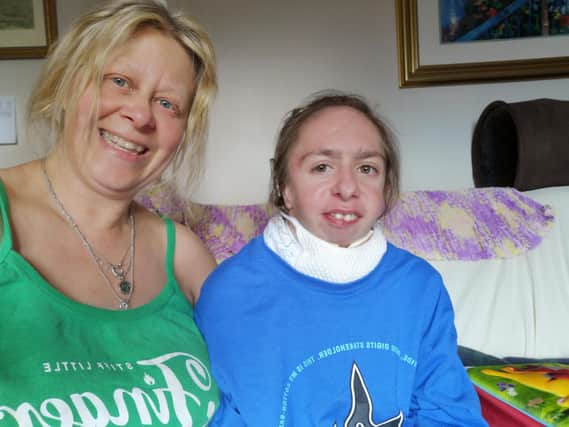"We are now beyond exhaustion" Bradford mum makes a plea for community to rally around disabled people as they adjust to life after lockdown


The figures, from disability charity Sense, show 61 per cent of disabled people are experiencing ‘chronic loneliness’ and more than a third (39 per cent) are anxious because they’re not able to comply with safety measures, such as social distancing and wearing a face covering.
The charity surveyed over 1,000 disabled people to mark Loneliness Awareness Week. Half said they have become isolated and lonely because they have been unable to access local activities and venues.
Advertisement
Hide AdAdvertisement
Hide AdNicola Slator, 55, from Bradford cares full time for her daughter Rebecca, who has a range of disabilities including mandibulofacial dysostosis and autism.
She said the situation for disabled people has not improved since before the first lockdown last year.
Mrs Slator said: “Life with people with disabilities hasn’t changed. We were isolated and alone before Covid started.
“Everyone is planning to come out of lockdown, but actually the infection rates are going up, and a lot of extremely vulnerable children aren’t vaccinated.
Advertisement
Hide AdAdvertisement
Hide Ad“They’re shielding and they can’t go out and play in the park. You hear people saying ‘oh gosh, after the year we’ve had we need a holiday’. We’re desperate to get respite, a lunch break, one day out. We don’t have that luxury.”
Mrs Slator must drive almost 100 miles a day in two round trips to take Rebecca, 20, to a specialist college in North Yorkshire as she is no longer afforded a taxi escort.
And her respite care, which is provided by Martin House Children’s Hospice, has also been reduced over the pandemic. Rebecca - who her mother says is "always smiling" - has also been unable to attend riding classes, which help her mental wellbeing.
"Rebecca is allocated a funding package, which we are constantly reminded is a large one," said Mrs Slator. "We are now beyond exhaustion. Technology and medical budgets to keep Rebecca alive and to continue to sustain her have not been matched by the system and society - including social services."
Advertisement
Hide AdAdvertisement
Hide AdIt comes as separate report from the Association of Directors of Adult Social Services (ADASS) showed there has been “significant additional need, activity and challenges to an already overstretched and under-resourced set of services and supports for older and disabled people over the course of the last year.”
Some 56 per cent of social care directors had seen an increase in requests for support during the pandemic where local services were cancelled, and 38 per cent said that community and voluntary support being cancelled had led to increase in demand.
Stephen Chandler, president of ADASS, said: “Some of the numbers we are seeing are phenomenal. The trends are unsustainable and show why the Government must publish its plans for social care as a matter of urgency.
“Our findings demonstrate very starkly that the crisis in social care is not just a crisis in the way we support older people. Half our spending is on help for adults of working age.”
Advertisement
Hide AdAdvertisement
Hide AdSense, has launched a campaign for communities to become more accessible for disabled people as lockdown lifts.
It is asking businesses with outdoor seating to ensure enough space is left for wheelchair users to be able to safely move.
And it is encouraging hospitality venues to provide large print or Braille menus for customers.
Richard Kramer, chief executive of Sense, said: “Let’s show patience and understanding if someone is unable to wear a face covering, and provide that extra space to someone we pass on the pavement – it may really help to put them at ease.”
The Department for Health and Social Care were approached for comment.